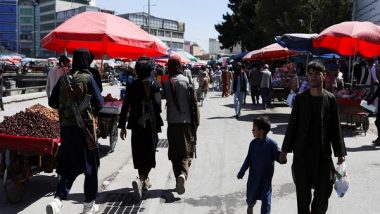Kabul [Afghanistan], July 1 (ANI): In Afghanistan, nearly 500,000 families may soon become homeless as a result of the increasing pressure from the government to send internally displaced people to their origin.
"Nearly 4,000 individuals have been evicted from their improvised homes just in and around Kabul," said Neil Turner, Country Director for Norwegian Refugee Council in a statement.
He further said that if this will continue, then tens of thousands of people will move once again and in such a situation, the aid organizations will also not be able to respond to another wave of displaced people, Khaama Press reported.
Afghans have been displaced by decades of war, droughts, political turmoil, and economic meltdown and have settled in enclaves outside of bigger towns that have over time developed into informal settlements.
Also Read | China Retains Zero-COVID Policy While Cutting Travel Quarantine to 7 Days.
In its statement, NRC called for settlement closures in Afghanistan to immediately come to an end. In addition to addressing the economic collapse and the cessation of development assistance, the Taliban authorities also need to focus on long-term solutions for displaced Afghans.
People are alleged to have been driven from the outskirts of Kabul, Mazar-e-Sharif, and some other provinces, such as Daikundi by the Taliban, according to Khaama Press.
The Norwegian Refugee Council's country director said that unless the good alternatives are secured, the closure of informal settlements will put the people, who are already struggling, at great risk.
Earlier in February, this year, the UN migration agency said that the conflict last year had forced more than 700,000 Afghans to leave their homes and added to the 5.5 million people already displaced over past years.
"The ongoing crisis in Afghanistan is intensifying humanitarian needs and increasing displacement risks both inside the country, as well as across borders to countries in the region", according to a statement issued by Ugochi Daniels, the International Organization for Migration's (IOM) Deputy Director-General for Operations.
Afghans, especially women and girls, are facing increasing vulnerabilities and protection risks, the UN agency said.
The Taliban ruled the country from the late 1990s to 2001. They again regained control after international troops withdrew in August and the Afghan Government collapsed.
As the country teeters on the brink of systemic collapse, more than half the Afghan population is in dire need of humanitarian assistance. "Nearly all Afghans have now plunged into poverty", Daniels said.
IOM explained that last year, Afghans increasingly crossed the border into Iran and Pakistan, describing it as a trend that is likely to continue in the coming months.
The UN agency warned that as needs continue to grow, failure to sustain and improve access to essential services, restore livelihoods, and effectively address the vulnerabilities of populations affected by the crisis, will cause a surge in displacement and migration. (ANI)
(This is an unedited and auto-generated story from Syndicated News feed, LatestLY Staff may not have modified or edited the content body)














 Quickly
Quickly
















